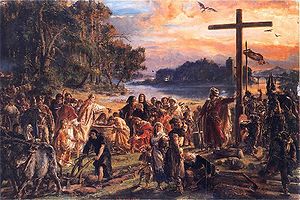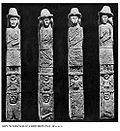
Baptism of Poland
Encyclopedia

Christianization
The historical phenomenon of Christianization is the conversion of individuals to Christianity or the conversion of entire peoples at once...
of Poland
Poland
Poland , officially the Republic of Poland , is a country in Central Europe bordered by Germany to the west; the Czech Republic and Slovakia to the south; Ukraine, Belarus and Lithuania to the east; and the Baltic Sea and Kaliningrad Oblast, a Russian exclave, to the north...
, commencing with the baptism
Baptism
In Christianity, baptism is for the majority the rite of admission , almost invariably with the use of water, into the Christian Church generally and also membership of a particular church tradition...
of Mieszko I
Mieszko I of Poland
Mieszko I , was a Duke of the Polans from about 960 until his death. A member of the Piast dynasty, he was son of Siemomysł; grandchild of Lestek; father of Bolesław I the Brave, the first crowned King of Poland; likely father of Świętosława , a Nordic Queen; and grandfather of her son, Cnut the...
, who was the first ruler of the Polish state. The next significant step in Poland's adoption of Christianity
Christianity
Christianity is a monotheistic religion based on the life and teachings of Jesus as presented in canonical gospels and other New Testament writings...
was the establishment of various ecclesiastical organs in the country during the 10th and 11th centuries. This included the building of cathedral
Cathedral
A cathedral is a Christian church that contains the seat of a bishop...
s and the appointment of clergy
Clergy
Clergy is the generic term used to describe the formal religious leadership within a given religion. A clergyman, churchman or cleric is a member of the clergy, especially one who is a priest, preacher, pastor, or other religious professional....
. This date should not be confused as the independence day of Poland.
In adopting Christianity as the state religion, Mieszko sought to achieve several personal goals. He saw Poland's baptism as a way of strengthening his hold on power, as well as using it as a unifying force for the Polish people. The exact place of Mieszko's baptism is disputed, historians having alternately argued that Gniezno
Gniezno
Gniezno is a city in central-western Poland, some 50 km east of Poznań, inhabited by about 70,000 people. One of the Piasts' chief cities, it was mentioned by 10th century A.D. sources as the capital of Piast Poland however the first capital of Piast realm was most likely Giecz built around...
, Poznań
Poznan
Poznań is a city on the Warta river in west-central Poland, with a population of 556,022 in June 2009. It is among the oldest cities in Poland, and was one of the most important centres in the early Polish state, whose first rulers were buried at Poznań's cathedral. It is sometimes claimed to be...
, Cologne
Cologne
Cologne is Germany's fourth-largest city , and is the largest city both in the Germany Federal State of North Rhine-Westphalia and within the Rhine-Ruhr Metropolitan Area, one of the major European metropolitan areas with more than ten million inhabitants.Cologne is located on both sides of the...
or even Rome
Rome
Rome is the capital of Italy and the country's largest and most populated city and comune, with over 2.7 million residents in . The city is located in the central-western portion of the Italian Peninsula, on the Tiber River within the Lazio region of Italy.Rome's history spans two and a half...
was the site of the event. Mieszko's action proved highly influential; by the 13th century, Roman Catholicism had become the dominant religion
Religion
Religion is a collection of cultural systems, belief systems, and worldviews that establishes symbols that relate humanity to spirituality and, sometimes, to moral values. Many religions have narratives, symbols, traditions and sacred histories that are intended to give meaning to life or to...
in Poland, although pagan resistance denoted with the historic term 'Pagan reaction'
Pagan reaction in Poland
The Pagan reaction in Poland was a series of events in the Kingdom of Poland of the 1030s that culminated in a popular uprising. It was caused by dissatifaction with the economic situation and with the process of Christianization.-See also:...
remained until the 1040's.
Svetovid

Svetovid
Sventevith, Sventovid , Svyatovit , Svyatovid , Svyentovit , Svetovid , Suvid Sventevith, Sventovid (Russian and Bulgarian, and alternative name in Serbo-Croatian), Svyatovit (Ukrainian), Svyatovid (alternative name in Ukrainian), Svyentovit (alternative name in Ukrainian), Svetovid (Serbian,...
was the god which the people of Poland believed in before adopting to Christianity in 960 A.D. Svetovid is the Slavic God of war, fertility and abundance.
People's Republic of Poland
In 1966, the People's Republic of PolandPeople's Republic of Poland
The People's Republic of Poland was the official name of Poland from 1952 to 1990. Although the Soviet Union took control of the country immediately after the liberation from Nazi Germany in 1944, the name of the state was not changed until eight years later...
witnessed large festivities on the 1000-year anniversary of those events,with the Church celebrating the 1000 years of Christianity in Poland, while the communist government celebrated the secular 1000 years of Polish State.Norman Davies, God's Playground, Google Print, p.17
See also
- Adalbert of PragueAdalbert of PragueThis article is about St Adalbert of Prague. For other uses, see Adalbert .Saint Adalbert, Czech: ; , , Czech Roman Catholic saint, a Bishop of Prague and a missionary, was martyred in his efforts to convert the Baltic Prussians. He evangelized Poles and Hungarians. St...
- Dagome IudexDagome iudex"Dagome iudex" is one of the earliest historical documents relating to Poland. Poland is not mentioned by name, but reference is made to Dagome and Ote and their sons in 991, placing their land under the protection of the Apostolic See...
- Pagan reaction in PolandPagan reaction in PolandThe Pagan reaction in Poland was a series of events in the Kingdom of Poland of the 1030s that culminated in a popular uprising. It was caused by dissatifaction with the economic situation and with the process of Christianization.-See also:...
- History of Poland (966-1385)
- Christianization of Kievan Rus'

